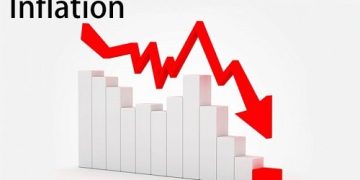Ghana’s year-on-year inflation rate has dropped to 8.0 percent in October 2025, marking the lowest level since June 2021 and the tenth consecutive month of decline, according to the latest data released by the Ghana Statistical Service (GSS).
The Consumer Price Index (CPI) for October stood at 257.0, up from 237.8 recorded in October 2024, representing a year-on-year increase of 8.0 percent. This means that on average, the price of goods and services rose by 8.0 percent over the one-year period.
Month-on-month inflation, however, recorded a 0.4 percent decline, indicating that general price levels slightly decreased between September and October 2025.
Speaking during the release, the Government Statistician, Dr. Alhassan Iddrisu, described the steady decline as a sign that Ghana is “firmly on the path to macroeconomic stability,” noting that inflation has fallen sharply from 23.8 percent in December 2024.
According to the GSS, food inflation dropped to 9.5 percent in October, down from 11.0 percent in September, while non-food inflation eased to 6.9 percent, compared to 8.2 percent in the previous month.
Prices of goods rose by 9.3 percent, down from 11.2 percent in September, whereas services inflation saw a marginal drop to 4.6 percent.
Inflation for locally produced goods declined from 10.1 percent in September to 8.0 percent in October, while imported items experienced a slight uptick from 7.4 percent to 7.8 percent, showing that imported inflation remains relatively subdued.
Inflation varied widely across regions. The North East Region recorded the highest inflation rate of 17.3 percent, while the Bono East Region had the lowest at 1.1 percent.
The Greater Accra and Ashanti Regions contributed most to the national inflation due to their larger weights in the CPI basket.
Price Drivers
The main contributors to October’s inflation included food and non-alcoholic beverages, housing, water, electricity, gas, and other fuels, as well as recreation and culture.
Among individual items, green plantain, smoked herrings, charcoal, ginger, and tomato paste were identified among the top drivers of price changes.
GSS Recommendations
The GSS urged households, businesses, and government to take advantage of the current low inflation to reinforce economic stability:
- Households were encouraged to budget wisely and save more.
- Businesses were advised to invest in local supply chains and efficiency improvements.
- Government was urged to maintain fiscal discipline and focus resources on keeping food prices low through improved storage, irrigation, and transport systems.
With inflation reaching its lowest in four years and registering ten straight months of decline, the GSS indicated that the economy is showing signs of sustained recovery and stability.
However, it emphasized the need for continued vigilance to prevent external shocks or supply constraints from reversing the gains made so far.
Video: NPP has sunk so low that Abronye can confront J.A Kufuor- Dr. Anane cries out
Source: www.kumasimail.com



































































